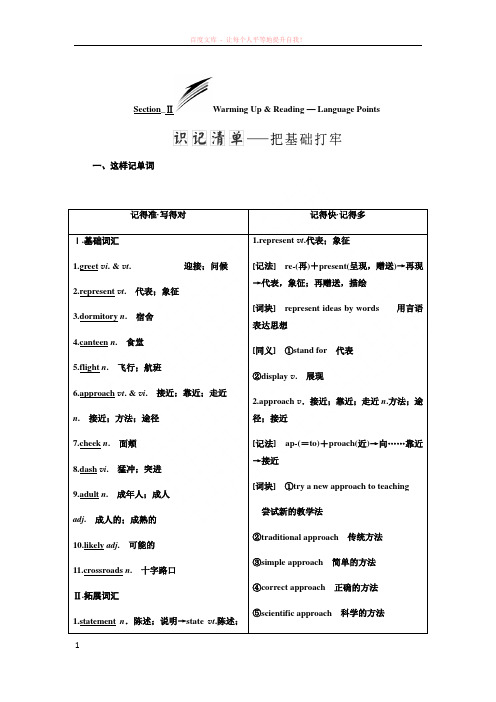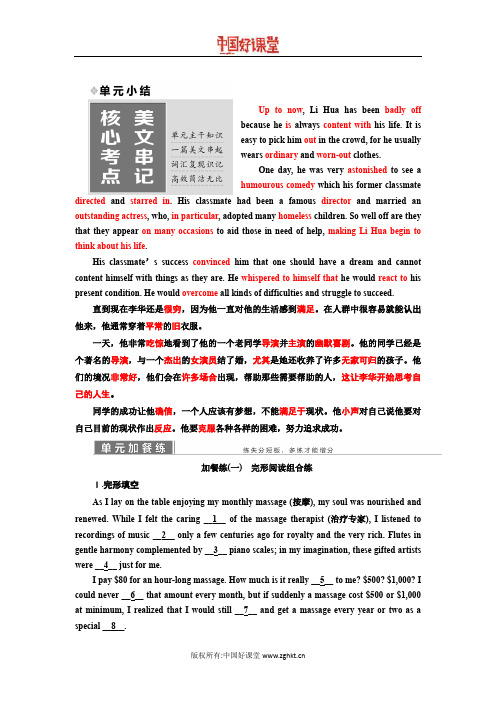2016新课标三维英语 必修四 unit 3-S3
新课标人教版高中英语必修4Unit 3 Section Ⅲ精品课件

时刻;场合 预算;开支 (slid,slid) (使)滑动;(使)滑行 滑;滑动;幻灯片
栏目 导引
Unit 3 A taste of English humour
4._w__h_is_p_e_r_____ n.
vt. & vi. 5.__d_r_u_n_k_______ adj.
耳语;低语 低语;小声说 醉的
Unit 3 A taste of English humour
1._b_u_r_s_t _in_t_o__la_u_g_h_ter 2._tr_e_a_t_.._.a_s_______ 3._p_ic_k__u_p________ 4._k_e_e_p_t_o_s_t_h_.____ 5._lo_o_k__u_p________ 6._b_r_in_g__o_u_t______
栏目 导引
Unit 3 A taste of English humour
2.In the third dialogue the customer really wants to know______________. A.the length of the pancake B.how soon the pancake will be ready C.the size of the pancake D.the shape of the t 3 A taste of English humour
4.From the story we can know that______________ . A.Doctor Watson was quite honest B.Sherlock Holmes was cleverer than Doctor Watson C.Doctor Watson was cleverer than Sherlock Holmes D . Doctor Watson thought in an ordinary way while Sherlock Holmes in a funny way 答案:1-4.CBAD
2015-2016年人教新课标高中英语必修四Unit3_全套课件

How many kinds of humor do you know?
sketch; cross talk
verbal
funny poems; funny stories;
jokes; limerick(打油诗) mime ; farce nonverbal clown
any mouse I like
She is good at Chinese Kongfu.
I want to lose my weight.
Riddle 谜语
1.What day of the week is the best for having fried foods?
2. What month do soldiers hate?
What is a punchline? Find the jokes’ punchlines.
POLICEMAN: Why did you have to break into the same shop three times? THIEF: Well, I stole a dress from that shop but my wife didn‘t like it. So I had to go back and change it twice!
mime
哑剧,滑稽剧
Do they have something in common ?
Chinese humorists
Two or more speakers make many jokes and funny conversae better:
verbal or nonverbal humour Give your reasons.
2016新课标三维英语必修四unit4-s2

Section_ⅡWarming Up & Reading — Language Points 一、这样记单词记得准·写得对记得快·记得多Ⅰ.基础词汇1.greet v i. & v t.迎接;问候2.represent v t. 代表;象征3.dormitory n. 宿舍4.canteen n. 食堂5.flight n. 飞行;航班6.approach v t. & v i. 接近;靠近;走近n. 接近;方法;途径7.cheek n. 面颊8.dash v i. 猛冲;突进9.adult n. 成年人;成人adj. 成人的;成熟的10.likely adj. 可能的11.crossroads n. 十字路口Ⅱ.拓展词汇1.statement n.陈述;说明→state v t.陈述;1.represent v t.代表;象征[记法]re-(再)+present(呈现,赠送)→再现→代表,象征;再赠送,描绘[词块]represent ideas by words用言语表达思想[同义]①stand for 代表②display v. 展现2.approach v.接近;靠近;走近n.方法;途径;接近[记法]ap-(=to)+proach(近)→向……靠近→接近[词块]①try a new approach to teaching尝试新的教学法②traditional approach 传统方法③simple approach 简单的方法④correct approach 正确的方法⑤scientific approach 科学的方法说明2.association n.社团;联系;联想→associate v t.结交;联合3.curious adj.好奇的→curiously ad v.好奇地→curiosity n.好奇心4.defend v t.保护;保卫→defence n.防御;保卫5.major adj.主要的→majority n.大多数6.misunderstand v t.误解;误会→misunderstanding n.误解;误会7.spoken adj.口语的→unspoken adj.未说出口的;非口语的8.employee n.雇员→employ v.雇用;使用→employer n.雇主→employment n.雇用;就业3.defend v t.保护;保卫[记法]de-(离开)+fend(击打)→躲开打击→保卫[词块]①defend one’s motherland 保卫祖国②defend the national interest 保护民族利益③defend one’s views 为自己的观点辩护④defend interests of 捍卫……的利益[同义]①protect v. 保护②guard v. 保卫[反义]attack v. 攻击4.major adj.主要的[反义]minor adj. 不很重要的[词块]①major earthquake 大地震②major industries 主要工业③major operation 大手术④major road 要道⑤major subjects 主修专业课程二、这样记短语记牢固定短语多积常用词块1.close_to靠近 1.different ways to greet someone using words2.in_defence 保卫;防御3.on_the_contrary 相反地4.be_likely_to 很可能……;有希望……5.in_general 总的来说;通常6.defend_against/from 保卫……以免受7.in_place_of 代替8.at_ease 舒适;快活;自由自在9.reach_out 伸出10.shake_hands_with 与……握手用话语问候某人的不同方式2.student association学生会3.international student 国际学生4.the student canteen 学生餐厅5.wait for their flight to arrive 等他们航班到达6.a major misunderstanding 一个大误会7.reach his hand out to ... 朝……伸出手8.move close to sb. 向某人靠近9.communicate with spoken language 用语言交流10.the only form of communication 唯一的交流方式先背熟再悟通后仿用1.The first person to arrivewas Tony Garcia fromColombia, closely followedby Julia Smith from Britain. 第一个到达的人是来自哥伦比亚来的托尼·加西亚,随后紧跟着的是来自英国的朱莉娅·史密斯。
2016新课标三维英语 必修四 unit 3 单元小结

Up to now, Li Hua has been badly offbecause he is always content with his life. It iseasy to pick him out in the crowd, for he usuallywears ordinary and worn-out clothes.One day, he was very astonished to see ahumourous comedy which his former classmate directed and starred in. His classmate had been a famous director and married an outstanding actress, who, in particular, adopted many homeless children. So well off are they that they appear on many occasions to aid those in need of help, making Li Hua begin to think about his life.His classmate’s success convinced him that one should have a dream and cannot content himself with things as they are. He whispered to himself that he would react to his present condition. He would overcome all kinds of difficulties and struggle to succeed.直到现在李华还是很穷,因为他一直对他的生活感到满足。
2016新课标三维英语 必修四 unit 1-S3

Section_ⅢGrammar—_主谓一致语法图解探究发现①Following Jane’s way of studying chimps, our group are all going to visit them in the forest.②Watching a family of chimps wake up is our first activity of the day.③Everybody sits and waits in the shade of the trees while the family begins to wake up and move off.④Jane warns us that our group is going to be very tired and dirty by the afternoon and she is right.⑤Ten hours has passed since I came here.[我的发现](1)句①中group强调成员,故其后谓语动词用复数形式;句③中的family和句④中的group强调整体,故其后谓语动词用单数形式。
(2)句②中的主语为动名词短语,故其谓语动词使用第三人称单数形式。
(3)表示时间、距离、金额、度量衡等名词作主语时,常表示一个整体概念,谓语动词用单数形式,如句⑤。
谓语动词与主语必须在人称和数上保持一致,这叫主谓一致。
主谓一致的应用主要有以下几种情况:一、名词作主语The public was kept in the dark about the matter.关于这件事情公众被蒙在鼓里。
The public now come to know the whole story.人们现在越来越清楚那是怎么回事了。
The football team is being rebuilt.(他们)正在重建这个足球队。
2016新课标三维英语 必修四 unit 3-S2

Section_ⅡWarming_Up_&_Reading_—_Language_Points二、这样记短语三、这样记句式1.(教材P17)Why did you have to break into the same shop three times?你为什么闯入同一家商店三次?break into 强行闯入;突然开始(笑、唱等);打入;参与上个星期,他的房屋曾有人闯入。
②The sun, broke_through at around lunch time.午饭时分,太阳破云而出。
③Peter broke_down and was unable to work for a year.彼得病后一年不能上班。
2.(教材P18)As Victor Hugo once said,“Laughter is the sun that drives winter from the human face”,and up to now nobody has been able to do this better than Charlie Chaplin.正如维克多·雨果曾经说的“笑声如阳光,驱走人们脸上的寒冬”。
关于这一点,直到现在也没有人能比查理·卓别林做得更好。
up to now 直到现在①The scientist is doing an experiment no one has tried up to now.这位科学家正在做一项迄今为止没人做过的实验。
[名师点津](1)up to now 意为“直到现在”,常与现在完成时连用,可放于句首、句尾或句中。
(2)up to now 的同义词组有up to present, so far, till now 等。
up to还可表示下列含义:(1)“多达;至多”;后面常接数字(2)“从事于;忙于”;有时含有“密谋干坏事”之意(3)“由……决定”,常用it作主语(4)“胜任;适合”(5)“是……的职责”写出下列句中up to 的含义②Up to 10,000 students have dropped off school this year.多达③What is he up to now?忙于④It’s up to you to decide whether to go or not.由……决定⑤He is not up to his work.胜任;适合3.(教材P18)He made people laugh at a time when they felt depressed, so they could feel more content with their lives.在感到沮丧的时候,他可以使他们开怀大笑,于是人们就对自己的生活感到更加满足。
2016新课标三维英语 必修四 unit 3-S4

Section_ⅣLearning_about_Language_&_Using_Language[原文呈现]ENGLISH JOKES1.(1)C:What’s that fly doing in my soup?W:Swimming, I think!①(2)C:What’s that?W:It’s bean soup.C:I don’t want to know what it’s been. I want to know what it is now.②(3)C:Waiter, will the pancakes③ be long?W:No, sir. Round.④2.Sherlock Holmes⑤ and Doctor Watson went camping⑥ in a mountainous area⑦. They were lying in the open air⑧ under the stars. Sherlock Holmes looked up at⑨the stars and whispered○10,“Watson, when you look at that beautiful sky, what do you think of?”Watson replied,“I think of⑪how short life is and how long the universe has lasted⑫.”“No, no, Watson!” Holmes said.“What do you really think of?” Watson tried again.“I think of how small I am and how vast⑬the sky is.”“Try again, Watson!” said Holmes. Watson tried a third time⑭.“I think of how cold the universe is and how warm people can be in their beds.” Holmes said,“Watson, you fool⑮!Y ou should be thinking that someone has stolen our tent!”[读文清障]第一部分为餐馆笑话,是发生在顾客与服务员之间机智、幽默的对话。
2016新课标三维英语 必修四 unit 1-S2

Section_ⅡWarming Up & Reading — Language Points二、这样记短语三、这样记句式1.(教材P1)Women of achievement卓有成就的女性achievement n.[C]成就;功绩success.我们已取得了良好的开端。
但接下来,要取得最终的成功还有更多的工作要做。
②She hoped to achieve_her_goal to become a singer.她希望实现自己的目标,成为一名歌手。
[语境串记]I’ve achieved only half of what I’d hoped to do, so I can not celebrate the achievements I’ve made although everyone said I should feel a sense of achievement.我原本希望做的只做到一半,因此我不能庆祝自己所取得的成绩,尽管每个人都说我应该有成就感。
2.(教材P1)Her research showed the connections between chimps and human beings.她的研究揭示了黑猩猩和人类的关系。
connection n.[C,U]连接;关系;联系污染和树木枯死之间有关系。
②As far as I know, he has_no_connection_with the accident.据我所知,他与这起事故无关。
③I am writing to you in_connection_with your recent job application.我写此信与你最近求职一事有关。
④People usually connect China with silk and good food.人们一提到中国,往往会联想到丝绸和美食。
3.(教材P2)Jane has studied these families of chimps for many years and helped people understand how much they behave like humans.简研究这些黑猩猩家族已经很多年了,她帮助人们了解了黑猩猩跟人类的行为是多么相似。
- 1、下载文档前请自行甄别文档内容的完整性,平台不提供额外的编辑、内容补充、找答案等附加服务。
- 2、"仅部分预览"的文档,不可在线预览部分如存在完整性等问题,可反馈申请退款(可完整预览的文档不适用该条件!)。
- 3、如文档侵犯您的权益,请联系客服反馈,我们会尽快为您处理(人工客服工作时间:9:00-18:30)。
Section_ⅢGrammar—动词-ing形式作表语、定语和宾语补足语语法图解探究发现①You may find it astonishing that Charlie was taught to sing ...②Such training was common in acting families at this time ...③He could mime and act the fool doing ordinary everyday tasks.④...his subtle acting made everything entertaining.⑤He grew more and more popular as his charming character, the little tramp, became known throughout the world.⑥How did the little tramp make a sad situation entertaining?⑦The acting is so convincing that it makes you believe that it is one of the best meals he has ever tasted动词-ing形式作表语的句子为⑦。
(2)动词-ing形式作定语的句子为②③⑤。
(3)动词-ing形式作补语的句子为①④⑥。
(4)比较句②和句③,可以看出单个现在分词作定语时要放在它所修饰的名词前面;现在分词短语作定语时要放在它所修饰的名词后面。
一、动词-ing形式作表语作表语的动词-ing形式包括现在分词和动名词。
1.现在分词作表语,往往具有形容词的性质,说明主语的性质、特征等。
作表语的现在分词,许多是由能够表示人们某种感情或情绪的动词变化而来的。
常见的有:moving, interesting, encouraging, exciting, inspiring, boring, surprising, puzzling, amusing, astonishing ...这类分词有“令人……的”的含义,常修饰物。
The argument is very convincing.这个论点很令人信服。
He remained standing beside the table.他依然站在桌旁。
[名师点津]不定式和动词-ed形式也可作表语,但不定式通常强调一次性的、具体的、将要发生的动作,动词-ed形式则表示被动、完成含义。
2.动名词作表语多表示抽象性的或习惯性的动作,一般说明主语的内容。
Her job is keeping the lecture hall as clean as possible.=Keeping the lecture hall as clean as possible is her job.她的工作是尽量使报告厅保持干净。
[即时演练1](1)试判断下列句中动词-ing形式的类型:A.动名词B.现在分词①My hobby is collecting stamps.__A__②What you said is really inspiring.__B__③What I am tired of is waiting here alone.__A__(2)对比翻译①他的工作是粉刷墙。
His_job_is_painting_walls.②他的工作是粉刷这面墙。
His_job_is_to_paint_the_wall.二、动词-ing形式作定语动名词和现在分词都可以作定语,但有所区别。
1.动名词作定语表示被修饰词的某种性能或用途,相当于for引导的介词短语。
No one is allowed to speak aloud in the reading room.阅览室里不准大声说话。
2.现在分词作定语时,它和被修饰词之间有逻辑上的主动关系,表示所修饰词进行的动作,相当于一个定语从句。
The boy playing football on the playground is my younger brother.=The boy that/who is playing football on the playground is my younger brother.在操场上踢足球的那个男孩是我的弟弟。
[名师点津]现在分词、过去分词和不定式作定语的一般区别:现在分词表示正在进行或习惯性的动作;过去分词表示被动或完成意义;不定式表示动作尚未发生。
You should adapt to the changing situation.你应该适应不断变化的形势。
The ground is covered with fallen leaves.地上满是落叶。
I’m looking for a room to live in.我正在找房子住。
[即时演练2](1)一句多译正与老师谈话的那个人是我们班长的父亲。
→The_man_speaking_to_the_teacher_is_our_monitor’s_father.→The_man_who_is_speaking_to_the_teacher_is_our_monitor’s_father.(2)用所给词的适当形式填空①Our school went on an organized (organize) trip last week.②I can’t go with you, for I have a lot of work to_do (do).③(山东高考改编)There’s a note pinned to the door saying (say) when the shop will open again.三、动词-ing形式作宾语补足语动词-ing形式作宾语补足语时,表示正在进行的动作或经常存在的状态。
动词-ing形式常作以下动词的宾语补足语。
1.表示感觉和心理状态的感官动词(短语)(常见的有see, hear, feel, smell, find, notice, observe, look at, listen to等)+sb.+doing sth.(作宾补)。
I felt somebody standing behind me.我感觉有人站在我后面。
I saw the little boy crying there.我看到小男孩在那儿哭。
2.表示指使意义的使役动词(常见的有have, let, keep, get, leave等)+sb./sth.+doing sth.(作宾补)。
We kept the fire burning all night long.我们让火整夜燃烧着。
I won’t have you running about in the room.我不允许你在房间里跑来跑去。
[名师点津]使役动词接现在分词作宾语补足语表示“让……一直做某事”。
接不带to 的不定式作宾语补足语表示“让某人做某事”;接过去分词作宾语补足语,表示“主语请某人做某事,使完成某事或主语遭遇某事”。
Be careful, or you’ll have your hands hurt.当心,否则会弄伤手的。
3.用于with复合结构中。
I couldn’t do my homework with the noise going on.由于噪音不断,我没法做家庭作业。
With so many people looking at her, she felt nervous.这么多人看着她,她感到紧张。
[即时演练3](1)用所给词的适当形式填空①(全国卷Ⅱ改编)They use computers to keep the traffic running (run) smoothly.②(辽宁高考改编)The old couple often take a walk after supper in the park with their pet dog following (follow) them.③He had the walls painted (paint) this morning.④Tom’s mother made him paint (paint) the house.(2)补全句子①I suddenly felt myself being_hit by a heavy fist.我突然感到自己被重重地打了一拳。
②I found a beggar standing at the door.我发现一个乞丐站在门口。
③We shouldn’t keep our lights burning in the day.我们白天不应该开着灯。
④With all_fans_singing_together,_he felt so proud.所有的粉丝一起歌唱,他感到如此的骄傲。
⑤He wants to have his eyes examined tomorrow.他明天想去检查眼睛。
Ⅰ.用所给词的适当形式填空1.The villagers saw the fire burning brightly in the distance. When they hurried there, they found some houses burned to the ground already.(burn)2.When I was on my way to school this morning, I saw two women arguing (argue).3.By far, there are many problems remaining (remain) to be solved.4.The woman looking (look) at her map is a relative of my mother.5.Give me the blue raincoat, please, the one hanging (hang) behind the door.6.On the bank of the river, we found him lying (lie) on a bench, with his eyes fixed (fix) on a kite in the sky.7.He had his leg broken (break) while riding a bike.8.A beggar in rags stood there with his eyes staring (stare) at the steak on the plate.9.The stadium being_built (build) at present in our city is intended for the coming Asian Games.10.I made him repeat (repeat) his promise.Ⅱ.单句写作1.I saw a stranger sliding_into the manager’s office.我看见一个陌生人溜进了经理的办公室。
